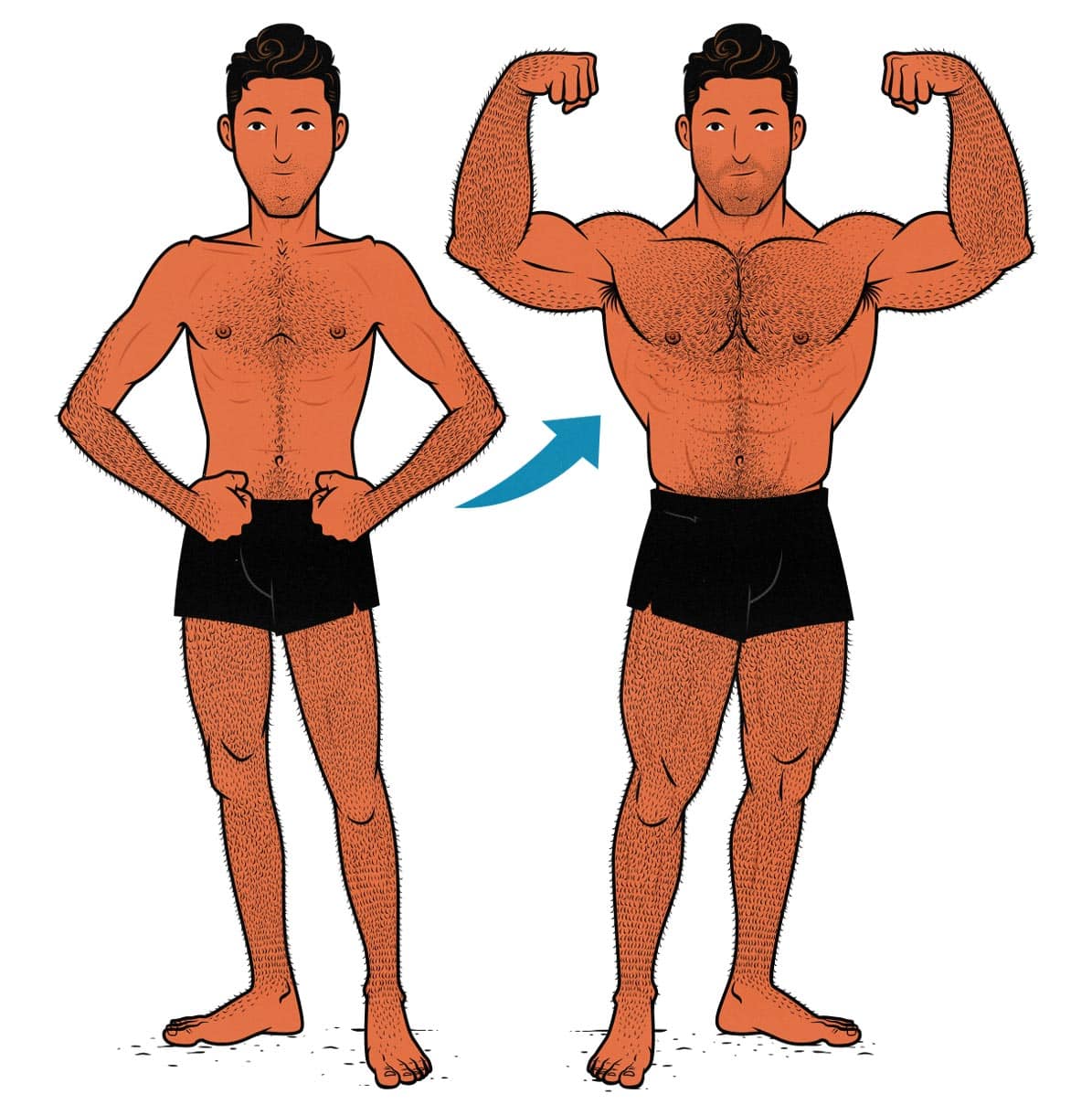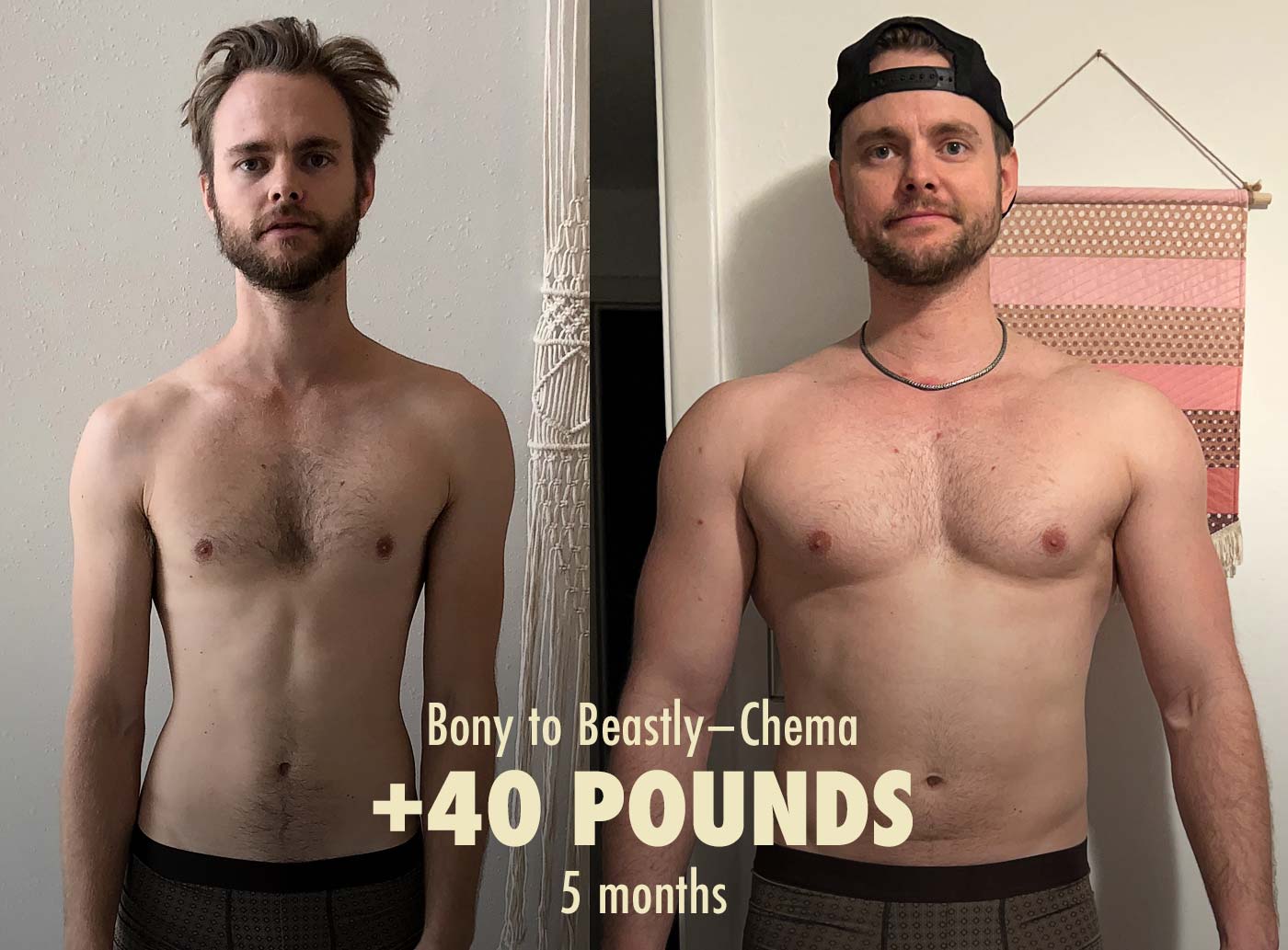
How Many Calories Do You Need to Gain Weight? (With Calculator)
You’ll often hear that the number of calories you need to gain weight depends on your age, sex, height, weight, activity level, and metabolic health. That works well if you’re overweight like everyone else. It works less well if you’re starting off thin and trying to become muscular, neither of which is typical.
If you’re trying to gain weight or build muscle, you can forget most of those factors. They’re for estimating how lean and muscular you are. If you lift weights, you can be lean and muscular at 20 or 50, so those proxies won’t do you much good. If you have a rough idea of your body-fat percentage, you can be much more accurate.
The other thing to consider is how fast you’re trying to gain weight. If you’re bulking leanly, you’ll need fewer calories. If you’re bulking more aggressively, you’ll need more.
So, I’ve made a simple calorie calculator that will ask you all these questions and spit out an estimate. Once you have that estimate, we can talk about what to do with it.

The Weight-Gain Calorie Calculator
This calculator is based on the Cunningham Equation, a simple yet impressively accurate formula for determining calorie needs based on weight and body-fat percentage (study). From there, we multiply it by the Physical Activity Factor, which is based on your activity levels. If you’re trying to build muscle, we can take it one step further, adding in the calories you’ll burn by exercising. That will give us a rough idea of how many calories you burn every day.
Then comes the next problem. The thinner you are, the more of your weight comes from your organs. Organs burn a tremendous amount of energy. Think of your heart pumping heroically all day long. Compare that to your biceps, which spend most of their time looking cool but doing little. Plus, the thinner you are, the greater your surface area is per unit of mass, meaning your body is harder to keep warm, forcing you to throw more calories into the furnace.
Weight-Gain Wizard
Calorie Calculator
Once we know how many calories you burn, we can add in the calorie surplus, driving your weight up. You can decide how quickly you want to gain weight. I’ve put in a dropdown menu with a few different options.
What If That Isn’t Enough Calories?
Naturally thin people often resist weight gain. That’s why we’re thin. Sometimes when we increase our calorie intake, our metabolism increases by a near-proportionate amount, preventing us from gaining weight as quickly as we’d like. We’ve written about this in our hardgainer article.
The solution is as simple as it is cruel. If the calorie calculator underestimates your metabolism, you’ll need to add yet another 200 calories to your diet. If you find that as hard as I do, we have an article about how to eat more calories.

What If You Stop Gaining Weight?
The more weight you gain, the more weight you’ll need to carry around with you. Plus, muscle is metabolically active, burning around 6 calories per day at rest (study). As a result, your daily calorie needs will increase by about 12 calories for every pound you gain (explanation).
There’s the other factor to consider, too. Many of us have adaptive metabolisms (study). As we acclimatize to eating more food, our bodies begin spending more calories. It’s similar to how if you get a raise, you might increase your living expenses, lest your savings account overflow with extra money. In this case, the “savings account” is your body fat, so it’s nice to keep it trim. Still, your calorie needs may increase by more than you expect.
Anyway, it’s normal for your weight to stall. If a week goes by and you haven’t gained weight, it might just be a fluctuation, so hold steady for another week. If your weight stays the same for a second week, add another 200 calories to your diet. Every time your weight stalls, repeat this process, adding as many calories as you need to keep your weight moving ever upwards.
You Won’t Need to Eat This Much Forever
When I first started bulking, I was terrified my calorie needs would keep climbing higher and higher. I worried that to maintain my gains, I would need to overeat forever. Thankfully, that wasn’t true. I’m nearly 70 pounds heavier than when I started, and I enjoy my diet now more than ever.
When you finish bulking, you can do a Reverse Bulk. You’d keep working out, eating a good diet, and living a healthy lifestyle, but you’d start listening to your appetite again, eating only as much as you want to. You’ll lose some fat, your metabolism will slow back down, and you’ll be back to eating an intuitive, comfortable amount of food.

Alright, that’s it for now. If you want to know the ins and outs of bulking up, we have a free newsletter. If you want a full muscle-building program, including a 5-month workout routine, a bulking diet guide, a gain-easy recipe book, and online coaching, check out our Bony to Beastly Bulking Program. Or, if you want a customizable intermediate bulking program, check out our Outlift Program.

